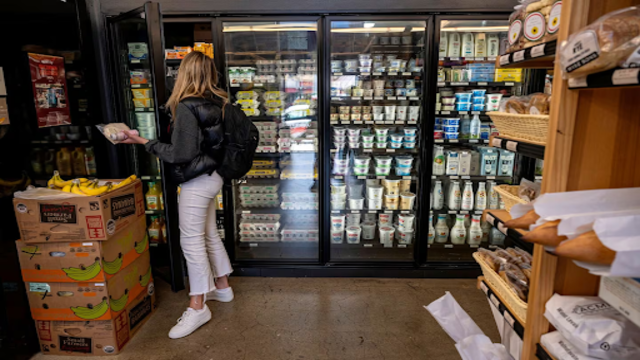
A shopper in a San Francisco grocery store on June 7, 2024. The Bureau of Labor Statistics is set to release the latest US consumer price index (CPI) data on June 12. (Bloomberg)
A new report shows that Canadians are becoming increasingly anxious about food prices. The Spring 2025 Canadian Food Sentiment Index reveals that rising costs are the top concern when it comes to inflation. The survey, conducted in March 2025, gathered insights from about 3,000 Canadians across all provinces and territories.
The findings suggest that Canadians are buying less food compared to a year ago, and many expect food prices to continue rising. The report indicates a clear shift in consumer expectations, with more people anticipating double-digit inflation. However, fewer Canadians are using cost-saving strategies like coupons or switching stores. Instead, many are choosing store brands or buying in bulk.
Shift Toward Local Foods
Along with rising food concerns, Canadians are increasingly supporting local products. The survey found that 43.5% of Canadians now buy local foods regularly, a significant rise of 10 percentage points. Young Canadians, particularly from Generation Z, lead this change. This trend reflects broader concerns about supporting local businesses and strengthening national sovereignty.
Sylvain Charlebois from the Agri-Food Analytics Lab explains that Canadians are prioritizing support for local businesses as well as affordable food. He notes, “People are very focused on other issues, of course, our country’s sovereignty, supporting local business appear to be incredibly important for Canadians right now.”
Rising Interest in Nutrition and Taste
While affordability remains the primary factor in food shopping, the survey also highlights growing interest in nutrition and taste. In addition to shopping habits, Canadians are also spending more on dining out. Restaurant visits have increased, especially with warmer weather. According to Claude Moulaison, the general manager of Arthurs Urban Market, the number of customers and local products purchased has grown significantly.
Regional Differences in Attitudes
The report also sheds light on regional differences in food preferences. In Atlantic Canada, 75% of people support removing sales taxes on all food items, the highest level of support in the country. In contrast, Quebec showed the least support at 54.2%. These varying attitudes suggest that local preferences play a big role in food policy.
Trust in Food Institutions Improves
Trust in food-related institutions is also on the rise. The report shows gains in public trust toward independent grocers, Canadian food manufacturers, and regulatory bodies like the Canadian Food Inspection Agency. Sylvain Charlebois attributes this shift to the food inflation crisis, which has led many Canadians to seek out independent grocers they now trust more than before.
Overall Trends in Consumer Behavior
The report concludes that price increases are still prevalent across most categories, with few signs of price decreases. However, there is a slight easing in categories like household items and utilities. One-third of Canadians reported stable prices in areas like transportation, housing, and entertainment. Still, most Canadians continue to face higher costs, particularly for food.















